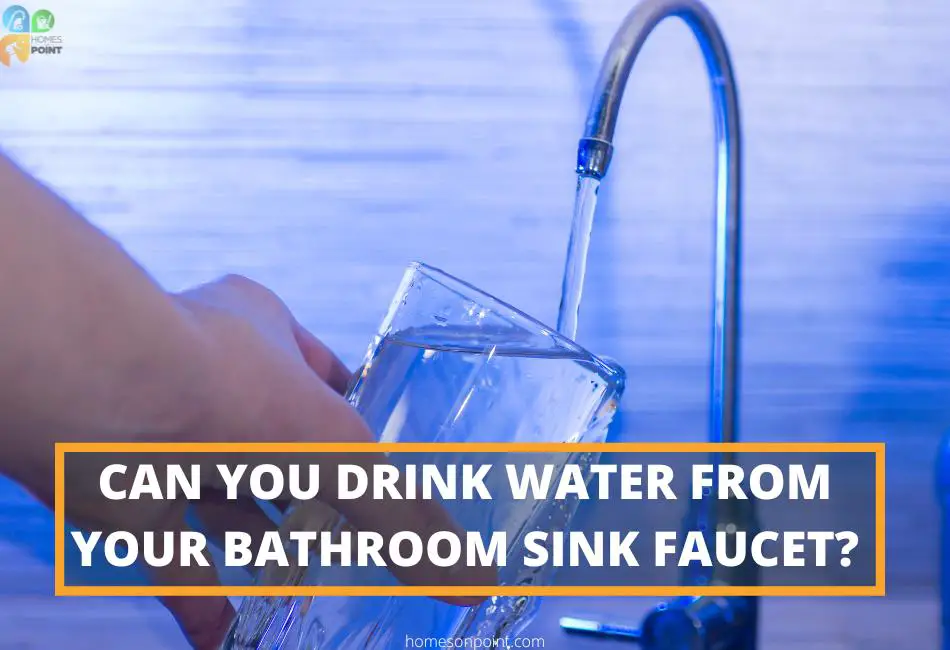Every day, we use water for a variety of purposes. We drink it, cook with it, bathe in it, and brush our teeth with it. We rely on water to sustain us and keep us healthy.
We’ve all been there. You’re at home, probably in the bathroom and you think to yourself, is it okay for me to drink the water from the bathroom sink faucet? But before you take a sip, you might want to think twice. Although it might seem safe—after all, it’s just water, right?
It can actually be pretty dangerous to drink bathroom sink water This is mostly because bathroom sink water sources are usually not very hygienic. They may contain some bacteria, viruses, and other contaminants that can make you sick. So stay away from drinking water from your bathroom sink faucet at all costs.
To help you better understand why you shouldn’t drink bathroom sink water, I have put together a summary of the best resources I found that is very useful. Please read along.
Reasons Why You Shouldn’t Drink Water From Your Bathroom Sink Faucet
Even if you only drink a small amount of bathroom sink water, you’re still exposing yourself to a number of risks. Here are some reasons why you shouldn’t attempt that in the first place:
1. Water may be coming from a storage tank
For starters, the water that comes out of your bathroom faucet is typically stored in a tank. For some home bathrooms, the plumbing is in such a way that water that flows into the bathroom doesn’t come directly from the main water supply.
The water from the main water supply is stored in a tank, so the water flowing through the bathroom sink faucet is from the stored water. Because the water sits idle until it is ready to be used, it can be contaminated with bacteria, viruses, and other unwanted agents.
Sometimes the water tank is an open tank. Meaning it’s prone to contamination from things like dust and insects.
This means that the water that you’re drinking may have been sitting in a storage tank for quite some time, and any contaminants present in the water may have multiplied and spread.
2. Bathroom water may be unfiltered
The level of treatment for bathroom water may be good for brushing teeth and washing hands but certainly not for drinking. In order to improve the quality of water, most households have in place filtration systems.
For example, using activated carbon filters or reverse osmosis systems to filter out contaminants from the water.
More often than not, filters are in place for water coming into the kitchen but unfortunately, bathroom water is usually not filtered. This means that any toxins or contaminants present in the water won’t be filtered out and could make you sick if you drink it.
3. The bathroom environment isn’t conducive to drinking water
The bathroom environment isn’t exactly a conducive place for drinking water. Bathrooms are often humid and moisture-filled, making it more likely for bacteria to grow and spread.
Although this isn’t necessarily true all the time, it’s still an additional risky factor you should consider before taking a sip of that tap water.
Again, we use all sorts of products, chemicals, and cleaners in our bathrooms. Plus, bathrooms are often places where we pee and poop, making it even worse for consuming any kind of liquid from there.
4. Water may be untested
Bathroom sink water is typically not tested for safety, so it can be difficult to know whether it is safe for drinking or not. This means that you could be ingesting contaminants without even knowing it.
Therefore, it’s best to avoid drinking any water coming from the bathroom sink faucet altogether.
5. Bathroom plumbing pipes may be dated
The plumbing pipes used in some bathrooms may be outdated and prone to corrosion especially if you live in an old house. This could make the water coming through the pipes contaminated with lead, rust, and other unwanted agents.
Consuming water with high levels of lead can lead to serious health complications. So, even if the water looks clean, it may not be safe for drinking.
Some Possible Health Risks Of Drinking Water From Your Bathroom Sink Faucet
When you consume water from your bathroom sink, you are exposing yourself to a whole lot of health hazards. Here are some health concerns to take into consideration.
1. Bacterial and viral infections
Drinking water from the bathroom sink can put you at risk of bacterial and viral infections. As mentioned earlier, bacteria can be present in stored water due to contamination or poor plumbing. This can lead to serious illnesses like cholera and typhoid fever.
2. Heavy metal poisoning
If you are drinking water from a bathroom sink with outdated pipes, you could be at risk of heavy metal poisoning. The most common metals found in plumbing pipes are lead, copper, and zinc.
3. Contamination from household products
Chemicals and other household products used in bathrooms can find their way into the water supply. This includes soaps, detergents, and other cleaners which can be hazardous if ingested.
Is it Safe To Drink Hot Water From Your Bathroom Sink Faucet Or Tap?
The short answer is, no. Hot water can increase the rate of contamination and make it even more dangerous to drink. You might be thinking that once the water is hot, it will eliminate the presence of any bacteria or contaminants.
Unfortunately, this is not always the case as some pathogens are able to survive in hot temperatures. For example, Legionella bacteria is commonly found in water heaters and can cause severe illnesses such as Legionnaires’ disease.
Additionally, remember that hot water is coming from a tank and the water might have been heated and cooled many times already. This will create the perfect environment for bacterial growth, leading to an increased risk of contamination.
Furthermore, hot water running through your already old plumbing pipes will further increase the rate at which contaminants such as lead and rust leach into the water supply.
Therefore, it is highly recommended to avoid hot water from your bathroom sink faucet or tap for drinking purposes. At the end of the day, it is best to play it safe and use filtered drinking water or boiled water for your drinking needs. This will help ensure that you are consuming safe and healthy water.
Conclusion
While the risks of short-term exposure to bathroom sink water are relatively low, the dangers of long-term exposure are much more serious. If you regularly drink unfiltered bathroom sink water, you could be putting yourself at risk for a number of serious diseases and health.
To play it safe, stick to clean, filtered drinking water whenever possible. Your body will thank you for it in the long run.

